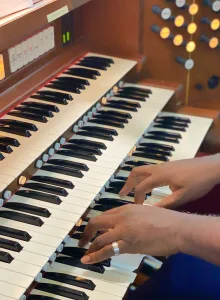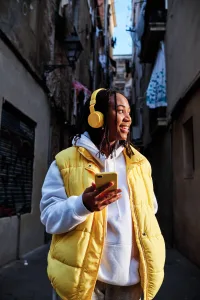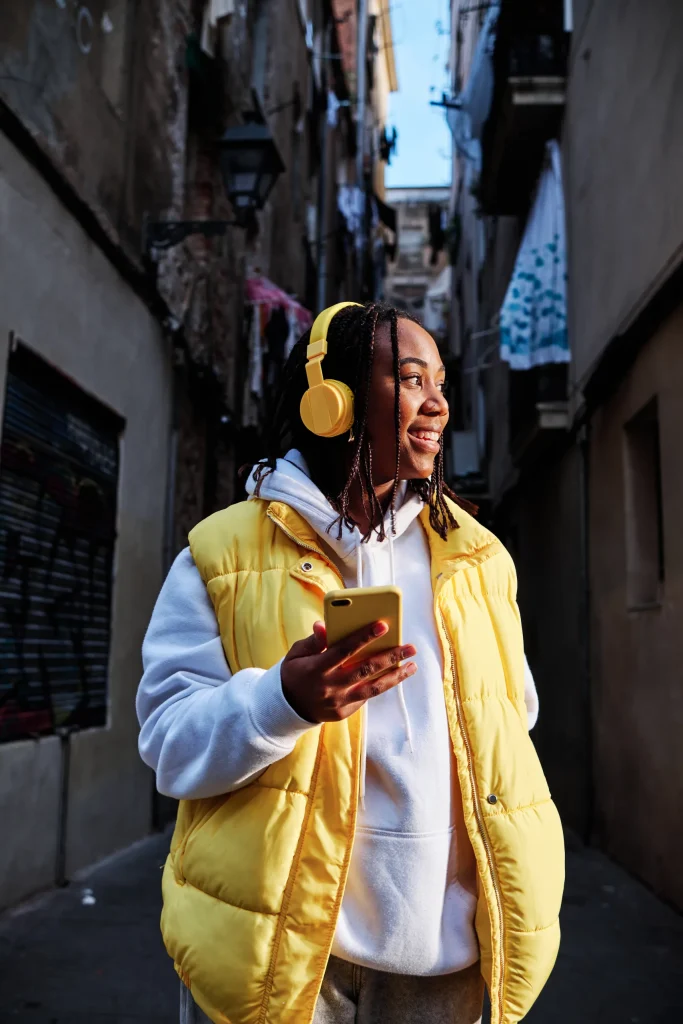Beyond the fun it brings, music is a powerful tool that has been used for many purposes, including relaxation, entertainment, and as an art medium. The infusion of music and Artificial Intelligence is masterfully changing how we create, consume, and interact with music. From producing algorithmic pieces to analysing consumer behaviour to make better marketing decisions, AI is revolutionising everything in between.
Without a doubt, the music industry’s growth and development have always relied on innovation and technological advancements. Neural networks are now powering music technology with limitless possibilities. For instance, through machine learning algorithms that examine past songs’ lyrics and melodies from different genres and then generate novel compositions based on similarities in harmonic patterns or lyrical themes.
The disruptive potential of music AI cannot be overemphasised; this technology can scour lots of social media data about your audience right down to their likes and choices concerning your brand’s genre-specific offerings. That said, while these ideas sound futuristic or hard to grasp at first glance, considering the vast amount of human intuition there is creating music; all these game-changing innovations might leave you mesmerised by what this incredible combination of Music and Artificial Intelligence could truly achieve.
So if you are curious about how AI is taking over the music industry one step at a time or would like a more nuanced look into how it could change things for artists around the world – hang on tight! We’ve compiled exciting insider details on some unexpected ways AI Innovation could blow our minds as much as it has done in other industries before now. Buckle up; there’s no limit to what potentially awaits anyone out there with passion for both algorithms & melody!
Revolutionising the Music Industry with AI-Generated Music Compositions
 In recent years, artificial intelligence has transformed various industries, and the music industry is no exception. One of the most exciting ways in which AI is disrupting music creation is through music composition. With AI algorithms analysing vast amounts of musical data such as chord progressions and melodies, original compositions can now be created in a matter of minutes rather than months.
In recent years, artificial intelligence has transformed various industries, and the music industry is no exception. One of the most exciting ways in which AI is disrupting music creation is through music composition. With AI algorithms analysing vast amounts of musical data such as chord progressions and melodies, original compositions can now be created in a matter of minutes rather than months.
The potential for this capability to disrupt traditional music composition processes is undeniable. Instead of a human composer creating a piece from scratch, they can now use AI to assist them with generating compositions that align with their desired style or genre. One example of AI-powered music composition is AIVA. This AI composer has been trained on a vast database of classical music and can generate pieces in various styles like rock, pop, jazz, and more.
AIVA’s commercial product “Music Engine,” for instance, allows users to combine music and artificial intelligence to create short original AI-generated music compositions without any human intervention required. The technology leverages deep learning algorithms capable of comprehending the structure and nuances of musical scores from different periods/styles to craft new pieces from scratch.
Though some may argue that this could lead to lower quality musical output due to removing human creativity from the process entirely. The fact remains: This technological innovation is taking what was once impossible and making it possible at an unprecedented pace.
As AI-generated content continues to evolve rapidly, raising new ethical concerns while illustrating compelling advances – we must ask ourselves what role humans will play in the future iteration of these technologies? That being said, there’s no doubt that by harnessing the power of artificial intelligence in music composition we’re opening doors previously unimagined by pioneers in this field not long ago—only time will tell where these developments will ultimately lead us, but we’re sure these innovations are set to blow our minds!
The AI Singer That Will Leave You Speechless: Synthesizer V Takes Music to the Next Level
 Synthesizer V is a revolution in the world of contemporary music and artificial intelligence. Developed by Dreamtonics, it uses deep learning to analyse and model the characteristics of human singing, effectively creating an AI singer that can perform with nuance and emotion. The software has undergone numerous updates since its initial unveiling, including the recent addition of Cantonese as its fourth supported language, and future support for rap vocals.
Synthesizer V is a revolution in the world of contemporary music and artificial intelligence. Developed by Dreamtonics, it uses deep learning to analyse and model the characteristics of human singing, effectively creating an AI singer that can perform with nuance and emotion. The software has undergone numerous updates since its initial unveiling, including the recent addition of Cantonese as its fourth supported language, and future support for rap vocals.
One of Synthesizer V’s most impressive features is Cross-lingual Singing Synthesis. This ground-breaking technology allows the AI voice databases to sing fluently in English, Japanese and Mandarin regardless of whether the vocalist learned these languages – effectively breaking down language barriers in music. In addition to this feature, the latest version also boasts “High Dynamics Voice Model” which incorporates natural dynamics from singing into synthetic voices.
Synthesizer V’s success has been undeniable since becoming compatible with AI. As reported by AH-Software, sales far exceeded expectations within the first year after implementing AI capabilities. And with this kind of unparalleled innovation taking place at breakneck speed, it’s clear that electronic music is poised to reach new heights in the years ahead.
As we look to the future of music and artificial intelligence, there’s no doubt that Synthesizer V will play a major role in shaping it. Whether you’re a musician looking for cutting-edge tools to push your craft forward or simply an enthusiast excited about what’s on the horizon for electronic music, Synthesizer V stands out as one of the game-changing innovations poised to blow our minds.
From Words to Music: How MusicLM is Revolutionizing the Way We Create and Enjoy Music
 In recent years, music has been a subject of growing interest in artificial intelligence research. Google, for instance, has developed MusicLM, an AI model that utilizes language to create high-fidelity music from text descriptions.
In recent years, music has been a subject of growing interest in artificial intelligence research. Google, for instance, has developed MusicLM, an AI model that utilizes language to create high-fidelity music from text descriptions.
MusicLM is designed to generate a piece of music based on the text inputs it receives through language modelling techniques. This AI model is able to understand musical concepts such as tone, melody and rhythm by using a hierarchical sequence-to-sequence modelling process.
By representing music as a sequence of tokens, MusicLM models the relationship between each token and contextually relevant harmonies and rhythms to generate complex and sophisticated melodies.
What makes MusicLM different from other AI-generated music systems is its capacity for generating long sequences of coherent and perceptually meaningful audio that can last more than a few minutes while maintaining 24 kHz quality sound.
This innovation represents an exponential step forward in creating new forms of electronic music where one only needs to type what they have in mind for the system to interpret it musically. In this way, with the integration of music and artificial intelligence, our understanding and appreciation of music will continue to grow and evolve.
As we anticipate more game-changing innovations like MusicLM in the future, it’s safe to say that there are no limits to how far technology can take us when it comes to unlocking the full potential of music and artificial intelligence.
Music Just Got Personal: How AI-Powered Recommendations Are Changing the Music Industry
 The power of Artificial Intelligence (AI) is being unleashed by the most popular streaming services in the world, such as Spotify and Apple Music, through personalized music recommendations. Using AI algorithms, these platforms analyse a listener’s music preferences, behaviour, and context to suggest the tracks they are likely to enjoy.
The power of Artificial Intelligence (AI) is being unleashed by the most popular streaming services in the world, such as Spotify and Apple Music, through personalized music recommendations. Using AI algorithms, these platforms analyse a listener’s music preferences, behaviour, and context to suggest the tracks they are likely to enjoy.
Spotify’s algorithm relies on three main features to determine recommended content: lyrical content and language, song features, and past listening habits. This ensures that listeners receive suggestions tailored specifically to their taste in music.
Apple Music also provides similar recommended playlists based on an individual’s past listening habits and new artists that they might like. In addition to this, Apple Music adds a few playlists right up top, so users can quickly listen to new music or some of their past favourites.
By using machine learning algorithms to analyse user data, these platforms can create more engaged audiences for artists and allow them to reach new fans. Personalized music recommendations provide users with access to tracks they may not have otherwise discovered on their own.
Music and artificial intelligence are coming together in 2023 to provide listeners with a more personalized and immersive music experience. As algorithms continue to improve over time, it is likely that more sophisticated analyses of user data will provide even more accurate and helpful suggestions for listeners.
The Future of Music Interaction: How AI-Powered Chatbots Are Connecting Fans with Their Favourite Artists
 Revolutionary advancements in artificial intelligence have led to the creation of voice-activated smart speakers and virtual assistants, changing the way we experience music forever. With AI-powered chatbots providing personalized experiences for fans, the power of music has never been more accessible or interactive.
Revolutionary advancements in artificial intelligence have led to the creation of voice-activated smart speakers and virtual assistants, changing the way we experience music forever. With AI-powered chatbots providing personalized experiences for fans, the power of music has never been more accessible or interactive.
Streaming music on these devices is proving to be a game-changer, with 60 percent of users surveyed asking their smart speakers like Alexa to “play music” while spending time with others. This makes it easily the most popular function, ahead of general questions and weather updates. But this listening isn’t random – nearly half of smart speaker owners pay for a monthly streaming subscription, a number that’s only set to climb.
Smart speakers from leading tech companies are being used as interactive tools to draw listeners to branded music platforms in what industry insiders are calling the next corporate streaming war. These dynamic gadgets are already being compared to Apple’s iPod and App Store launches in terms of their potential industry-wide impact.
One exciting innovation that could encourage further growth is AI-powered music consumption and interaction. As chatbots become more sophisticated in predicting an individual’s musical tastes, they can offer tailored recommendations that help break down preconceptions around genres or artists. By personalizing musical exploration, users can expand their horizons and discover undiscovered pieces of music – all at the touch of a button.
The power of music has never been greater than it is now, with these innovative technologies paving the way for enhanced access and interaction. The fusion between music and artificial intelligence promises to revolutionize the way we consume our favourite tunes and showcases an exciting future ahead for both industries!
The Ethical Questions of AI-Generated Music: Who Really Owns the Rights?
 The emergence of AI-generated music compositions raises several ethical questions regarding ownership and control. Who has the right to claim authorship over music created by AI? Is it the AI itself, its creator, or the user of the technology? These issues could have far-reaching implications for the music industry and traditional music jobs, such as composers and performers.
The emergence of AI-generated music compositions raises several ethical questions regarding ownership and control. Who has the right to claim authorship over music created by AI? Is it the AI itself, its creator, or the user of the technology? These issues could have far-reaching implications for the music industry and traditional music jobs, such as composers and performers.
One major concern is that copyright complications could arise with AI-generated music compositions. If an AI creates a piece of music, does it hold intellectual property rights to that composition? As AI technology continues to advance, these questions become more pressing. Some argue that if an independently operating AI can generate a complete musical piece without human input or influence, then it should have some form of ownership over its creation. However, under the law of many countries, it is only possible for a human to enforce copyright protection of a creation.
However, this raises further concerns about creative potential. If AIs are granted ownership over their creations, what incentive do humans have to continue composing music? Alternatively, if individuals retain full ownership rights of works created using AI technology, does this group monopolize creative expression at the expense of innovation?
The impact of AI-generated music on traditional job roles in the music industry also merits consideration. Composers and performers may face competition from AI-generated works that require less time and resources to create than their human counterparts. This trend is particularly concerning for musicians at risk of losing their livelihoods due to technological advances.
To navigate these challenges and develop ethical frameworks for ownership of AI-generated music compositions, collaboration between legal experts and technological innovators may be necessary. Possible solutions include establishing clear-cut laws surrounding AIs’ intellectual property rights or creating hybrid work that recognizes contributions from both AIs and humans.
As we explore new ways of merging music and artificial intelligence in innovative ways, we must also grapple with how these changes will affect artists’ livelihoods and creative expression. The solution lies not only in addressing issues such as copyright claims but also in finding ways for humans and AIs to work together towards ingenuity while preserving human artistic expression.
The Music Industry Revolution Has Begun: How Music and Artificial Intelligence is Changing the World
In conclusion, the integration of music and artificial intelligence has already marked a significant shift in the industry. The creative process is being disrupted and enhanced in exciting ways that we never imagined possible just a few years ago. From generating new songs through AI algorithms to personalized music recommendations, there are countless examples of how AI has transformed how we experience and create music. However, as with any digital innovation, copyright laws and ownership remain a major challenge for artists and producers alike.
Looking forward, the potential for AI to revolutionize the music industry even further is tremendous. As technology continues to advance, we can only imagine what kind of innovative tools will be developed to make our musical experiences more engaging and interactive than ever before. In this future world, artists will have unprecedented creative resources at their disposal while fans will enjoy a more personalized and immersive musical journey.
While there may be some growing pains as the industry adapts to these changes brought on by artificial intelligence, it is an amazing time to be a part of this unique period of transformation. With AI’s potential to produce never-before-heard sounds and reshape conventional ideas about melody and harmony, music lovers should keep their ears open for the next big breakthroughs in this fascinating realm where creativity meets technology.
